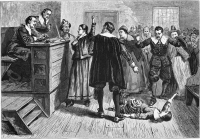
Recently I needed to research some historic content for some business information as part of a client project. The research led me to read through the societal behaviours and some of the outcomes that occurred in past centuries, predominantly being driven by public opinion vs evidence.
The research led me to read through some interesting societal behaviours in the 17th Century in England, and further throughout Europe and America. From approximately 1640 through to the end of the century existed what is often referred to as the witch hunts.
It was deemed that if people (mainly women) were seen to have behaviours that were suspected to be different from the general community of the time through their actions, or they may have had a close relationship with their pets or connected well with a range of animals, a portion of the community might recognize such characteristics and individuals in the community would label such people as suspects of witchcraft.
Additionally, if these suspected witches read horoscopes or palms, provided natural healing tonics, provided opinion on any future events, or simply dressed in a manner that was different, the level of community suspicion would escalate. All it needed for suspicion to be converted into condemning the accused a witch was an adverse event to occur in the community, such as exceptional rain or strong wind, an unexpected death, a community virus, or similar.
The finger-pointers would accuse the individual of using witchcraft to cause the adversity by design and therefore be labeled an evil person. The courts would rule on the emotional blame of the community and connect the adverse event to the accused as the instigator without any evidence being tabled or even required. The individual would be deemed as guilty of being a witch and sentenced to a public hanging or be burnt whilst tied to a stake without any opportunity to defend their case or appeal the court’s decision, simply because the community labeled the individual a witch.
On occasion, individuals would accuse others of being witches that they had grievances with, vulnerable widows with estates were accused as witches so that others would gain their fortune. Additionally, those that might benefit from the death of an individual accused of being a witch would initiate a rumour of the individual using witchcraft and rapidly convert the rumour into community hysteria.
The accusers knew that the targeted individual being labeled as a witch would have no level of defense in the judicial system and the accused could not challenge the court’s decision through any mechanism of appeal. The death sentences followed quickly after conviction, leaving little chance of the accused witch to present any further defense.
After reading a reasonable amount of historic content on such atrocities occurring in the 17 century, I thankfully acknowledged that as we now live in a learned and civilized society, we have evolved significantly from the days that a person would be accused then found guilty of perceived crimes without any evidence or actual crime being committed.
In our current times, we praise our community mind-set on being open, forming our individual judgement on the evidence available to us and not accusing or persecuting others in our community simply on the emotional content that some may promote. Our legal system is evidence based and does not become swayed by the emotional hysteria experienced in the 17th century.
We have truly evolved as an open-minded, evidence based society, or have we?
Maybe there are still some cracks in our open-minded armour that as much as we hide within, there is still a trace of 17th century mind-set that lingers.
